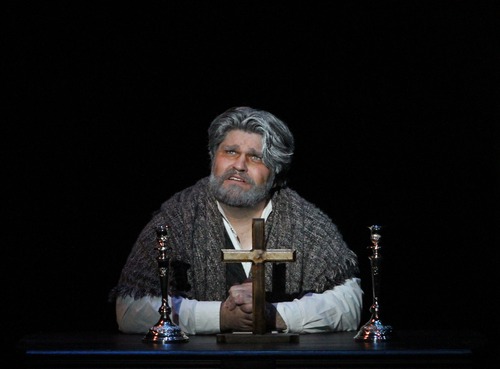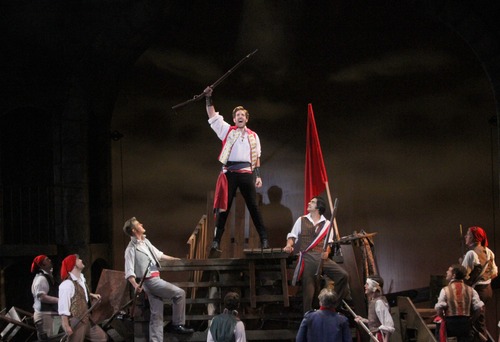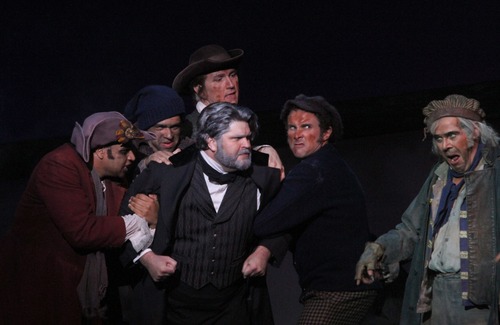This is an archived article that was published on sltrib.com in 2013, and information in the article may be outdated. It is provided only for personal research purposes and may not be reprinted.
When director Tom Hooper mounted a star-studded film adaptation of "Les Misérables," some wondered whether it would be curtains for Alain Boublil and Claude-Michel Schönberg's blockbuster musical. If fans could watch "Les Miz" in their pajamas whenever they wanted to, the reasoning went, would they still consider it worth the effort and expense of seeing it onstage?
Strong advance ticket sales for Pioneer Theatre Company's forthcoming 31-performance run, coming less than a year after last summer's well-received Utah Shakespeare Festival production, indicate that Utahns still love "Les Miz." A 2010 concert version of the musical, starring part-time Utahn Alfie Boe as Jean Valjean, remains a pledge-drive favorite on PBS affiliates including Salt Lake City's KUED. And nearly two-thirds of the readers who responded to The Tribune's recent online poll said they planned to see the film but would continue to attend live performances of the musical.
Utah audiences have a chance to experience "Les Misérables" in yet another form this coming week. The Utah Symphony will present "Do You Hear the People Sing," an evening of selections from "Les Miz," "Miss Saigon" and lesser-known Boublil-Schönberg musicals.
"It's the greatest hits of all their musicals," said Jennifer Paz, one of the concert's five featured vocalists — all of whom are veterans of the shows in question. Paz played the female lead, Kim, in the first national Broadway tour of "Miss Saigon" and also has appeared in productions of "Les Misérables."
In addition to singing the tunes, the performers will offer "behind-the-scenes anecdotes and insightful stories about how the shows came to life," Paz said. There will be some selections that were cut from the shows, as well as a French version of "On My Own."
Paz has seen and enjoyed the "Les Misérables" film. Yes, it was polarizing for musical-theater professionals, but "you're never going to please everyone," she said. "Acting on film is a completely different animal."
Robert Breault, a well-traveled tenor who directs the opera program at the University of Utah, likened the difference between film musicals and stage musicals to the difference between watching a football game in your living room and sitting in the stadium on a crisp autumn day. "There's something viscerally different about seeing human beings live," he said.
Breault noted that Hooper's film — which is up for Best Picture at tonight's Academy Awards — sparked lively arguments among musicians over the singing abilities of the big-name actors in the cast. As an opera singer, he approaches the issue from the other side: Professional singers are ramping up their dramatic game.
The old "park and bark" school of acting in opera and musical theater has all but disappeared, thanks in part to the Metropolitan Opera's high-definition broadcasts in movie theaters nationwide.
"We're being trained to be great actors as well as singers," Breault said. "Putting a camera and boom mikes in somebody's face changes the art form. HD means you have to be more credible as an actor. You can see people projecting life-size voices simultaneously to the back of the Met and to a theater in Wyoming. That's all the more reason to go see live theater."
Carol Anderson, Utah Opera's principal coach and longtime musical-theater lover, sees plenty of room for multiple incarnations of "Les Miz." The film and musical offer totally different experiences, she said.
Some of Anderson's friends and colleagues were dismayed that the film's producers cast high-profile actors, many of whom had little to no musical-theater experience. A couple even said they'd prefer that musicals not be made into movies if vocal proficiency wasn't the primary consideration.
Salt Lake City-based tenor Brian Stucki isn't sold on the film, but he doesn't consider it an artistic failure. "There was very much to be admired, but for me it didn't work. A lot of people were moved because of how raw the storytelling was and how well the actors communicated," he said, but too often, the suspense over whether a performer was going to hit the next note took him out of the story. "It was frustrating to me, but I was happy about the conversations it started."
Anderson takes a more pragmatic view.
"I understand that a studio isn't going to greenlight a multimillion-dollar film without big names," she said. "I wish we lived in a world where musical-theater professionals and opera professionals were revered with the same enthusiasm [as movie stars]. I wish they were household names. But they're just not."
So the producers went with the box-office draws. And that's OK. "The successful actors were the ones who paid the most attention to the text, emotion and delivery," Anderson said. "The others never got past the self-consciousness of the vocalism. [Anne] Hathaway and [Hugh] Jackman were incredibly effective at making you believe in the journey."
Anderson also hopes that the film's success will entice some viewers to give live theater a try. "I'm not convinced it won't be a gateway drug," she said.
Do you hear the people sing?
The Utah Symphony presents "Do You Hear the People Sing," with selections drawn from the musicals of Alain Boublil and Claude-Michel Schönberg.
With • Conductor Jerry Steichen, the Utah Symphony Chorus and soloists Eric Kunze, Terrence Mann, Jennifer Paz, Sarah Uriarte Berry and Marie Zamora.
Where • Abravanel Hall, 123 W. South Temple, Salt Lake City.
When • Friday and Saturday, March 1 and 2, 8 p.m.
Tickets • $29 to $85 ($5 more on performance day) at http://www.utahsymphony.org, 801-355-ARTS or the box office









